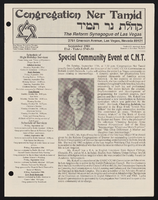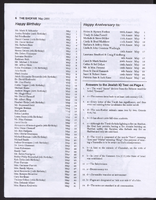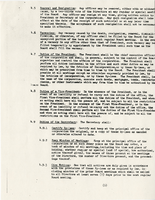Search the Special Collections and Archives Portal
Search Results
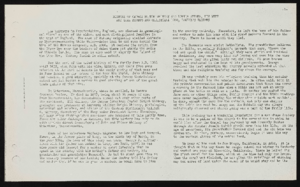
History of George Burton Whitney and Lovina Syphus, his wife and Luke Syphus and Christiana Long, Lovina's parents, undated Genealogical data sheet, John Mathieson Bunker and Mary Etta Syphus
Archival Collection
Description
From the Syphus-Bunker Papers (MS-00169). The folder contains documents about the history of George Burton Whitney and his wife, Lovina Syphus, and Luke Syphus and Christiana Long, Lovina's parents, and a genealogical data sheet for John Mathieson Bunker and Mary Etta Syphus.
Text

Margarita Rebollal oral history interview: transcript
Date
Archival Collection
Description
Oral history interview with Margarita Rebollal conducted by Marcela Rodriguez-Campo and Barbara Tabach on February 28, 2019 for the Latinx Voices of Southern Nevada Oral History Project. Margarita Rebollal is a lifelong community organizer and advocate for Latinx civic engagement and rights. She shares what it was like to grow up in Ponce, Puerto Rico and shares her childhood memories growing up on the island with her siblings. Rebollal also discusses the death of her father and the eventual move of her family to New York City, New York. She also recalls her education and teen years. Later, she would move to California, and eventually find her way to Las Vegas, Nevada in 1996. Rebollal discusses her passion for civic engagement and the many years serving the community, being most well-known for her role in founding the Puerto Rican Association of Las Vegas and the Hispanic International Day Parade of Nevada. Rebollal also discusses her campaign for the Ward 1 Las Vegas City Council seat.
Text
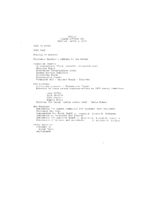
Meeting minutes for Consolidated Student Senate, University of Nevada, Las Vegas, March 5, 1974
Date
Archival Collection
Description
Text
Edythe and Lloyd Katz Photographs
Identifier
Abstract
The Edythe and Lloyd Katz Photographs (1947-1986) contain photographs of the businesses operated by Las Vegas, Nevada entrepreneurs Edythe and Lloyd Katz. The photographs primarily depict the movie theaters purchased by the Katz Family, including the Guild Theatre (formerly the Palace Theatre) and the Fremont Theatre. The photographs also depict the Katz Family and the Helldorado Days parade.
Archival Collection
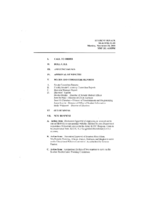
Meeting minutes for Consolidated Student Senate, University of Nevada, Las Vegas, November 20, 2000
Date
Archival Collection
Description
Text

Robert Kim oral history interview: transcript
Date
Archival Collection
Description
Oral history interview with Robert Kim conducted by Kristel Peralta, Cecilia Winchell, Ayrton Yamaguchi, and Vanessa Concepcion on March 05, 2021 for the Reflections: The Las Vegas Asian American and Pacific Islander Oral History Project. In this interview, Kim describes his career in law. He talks about his Korean roots, the model minority myth, and experiencing racial discrimination. Lastly, Kim discusses the Las Vegas Asian American and Pacific Islander (AAPI) community, his involvement with the Asian Bar Association of Las Vegas, and the importance of electing Asian Americans into political positions.
Text

Transcript of interview with Michael Tell by Barbara Tabach, January 6, 2018
Date
Archival Collection
Description
Michael Tell, the youngest son of Jack and Beatrice Tell, is the publisher of the Las Vegas Israelite newspaper and the second generation of ownership. He briefly traces his Jewish ancestral roots back to Eastern European grandparents who settled in New Jersey and New York. He became a bar mitzvah in a conservative Jewish synagogue in New York City. At age sixteen, he accompanied his father, Jack Tell, westward to Nevada. The elder Tell was in pursuit of owning a newspaper and Mike was a perfect companion as Jack took over ownership of the Territorial Enterprise. Mike recalls it was a short lived venture and the family settled in Las Vegas, where his father went to work for Hank Greenspun at the Las Vegas Sun and then for Henderson Home News, owned by Morry Zenoff. In 1965, Jack Tell opened the Las Vegas Israelite. Meanwhile, Mike explored the lucrative business of concert promotions and opened a teen nightclub 1961 called the Twin Lakes Twist. He hired such talents of the era as Bobby Darin and Wayne Newton. Soon his business acumen grew and he moved Mike Tell Productions to Los Angeles. He tells the story of his last concert, booking Al Green, and being held at gunpoint. Then in 1979, he returned to work at the Israelite, which had a circulation of about 2000. The Jewish community was beginning to show signs of growth. He recalls running an ad in 1992 for High Holy Days services to be held at the Aladdin hotel. He used the word “Lubavitvh” in the ad and this sparked an interest in Las Vegas from the Chabad movement. He also recalls anti-Semitic episodes in Las Vegas, such as Ralph Englestad’s Hitler birthday parties and the presence of Skinheads. And he reflects on the changes in the community that he has observed over the decades.
Text

